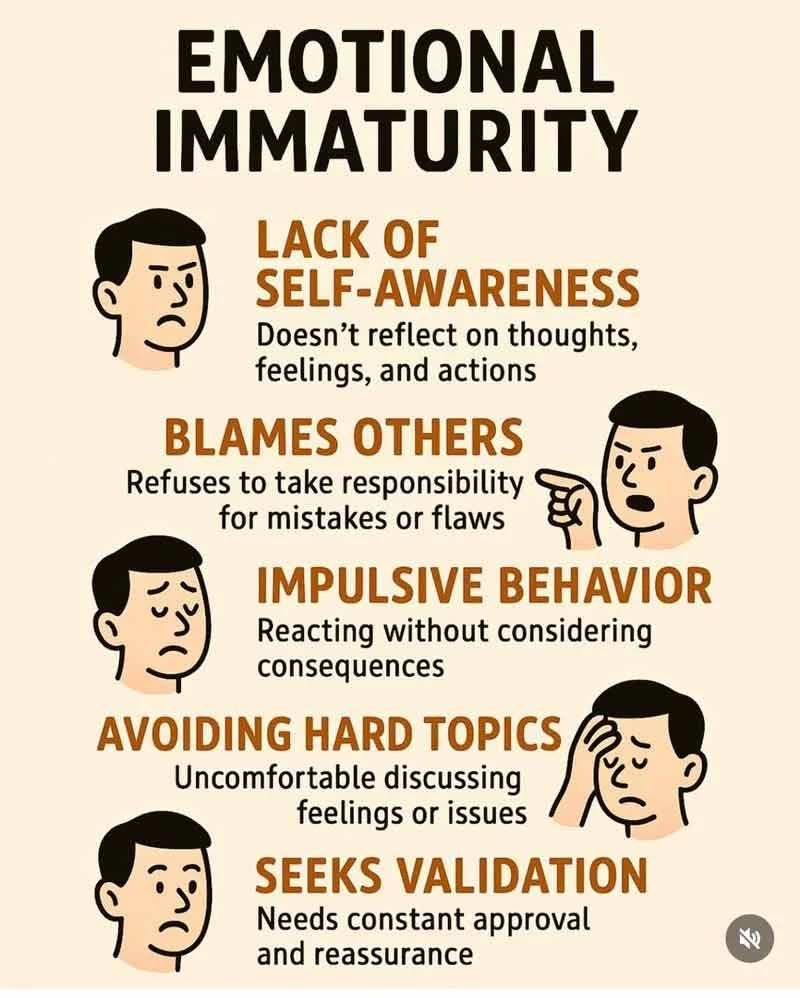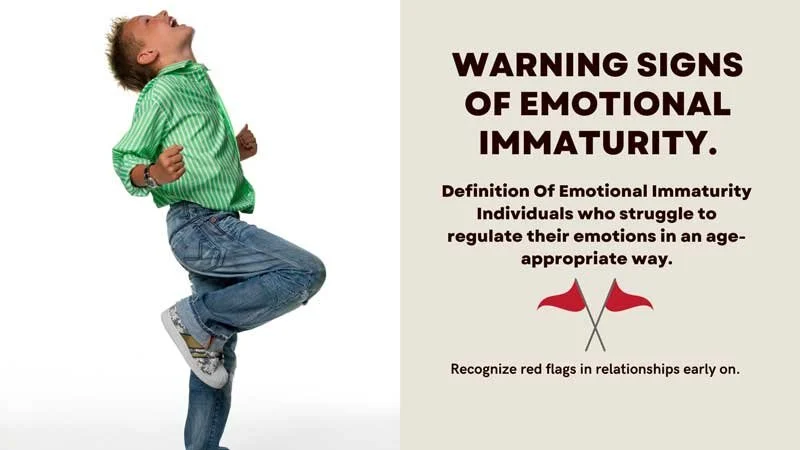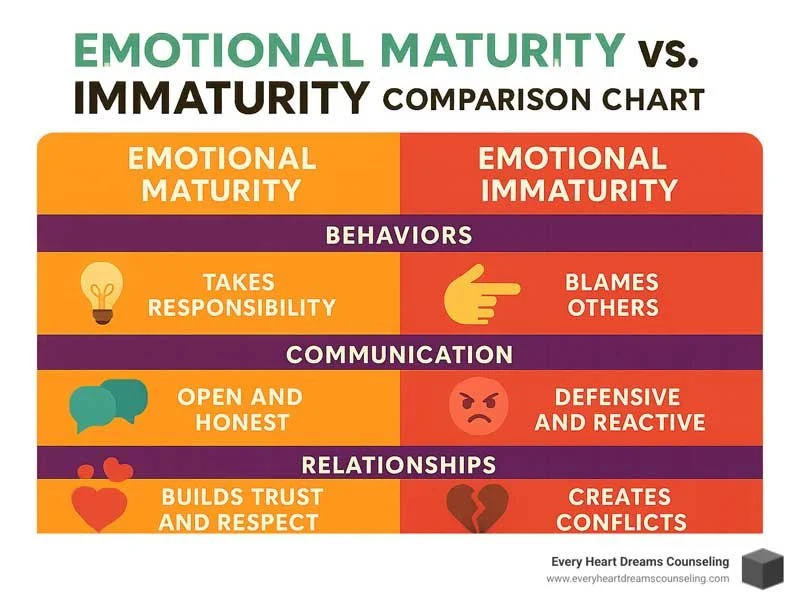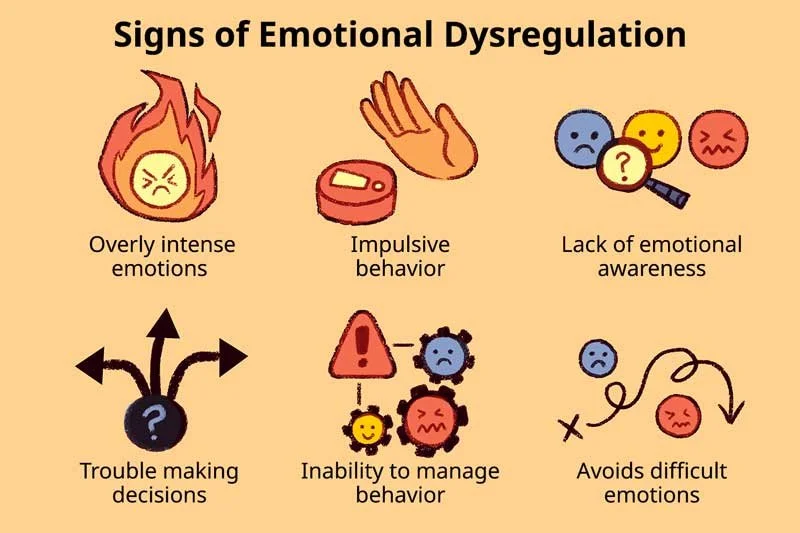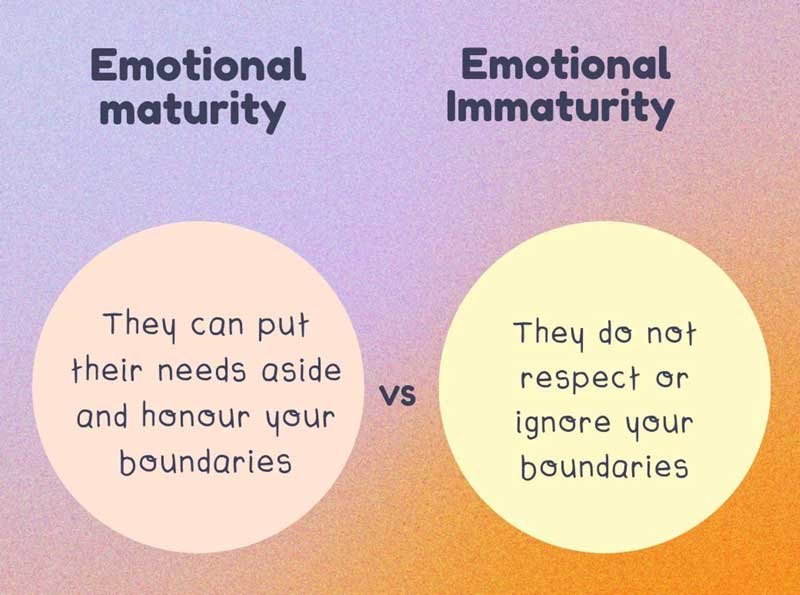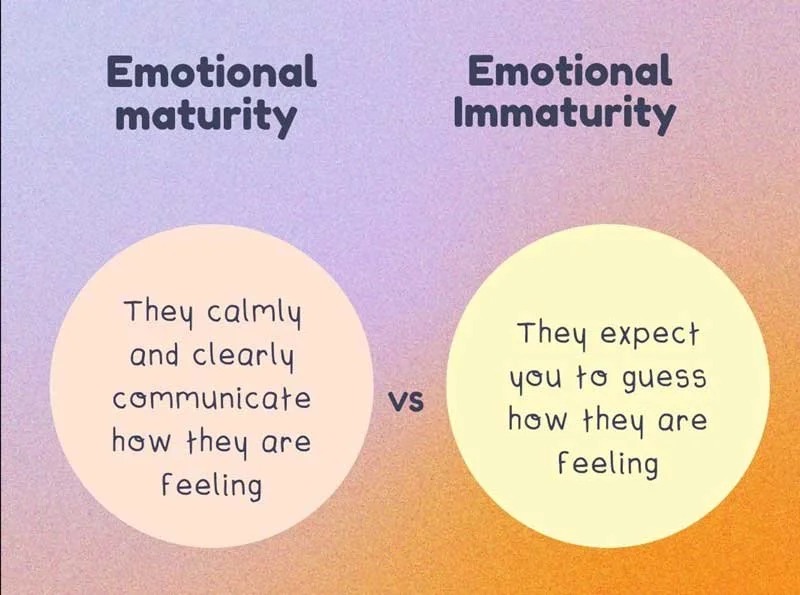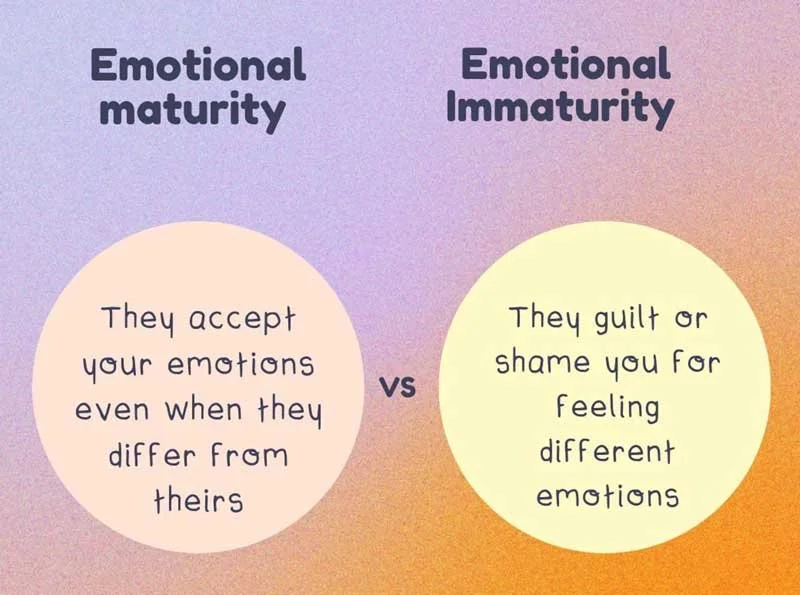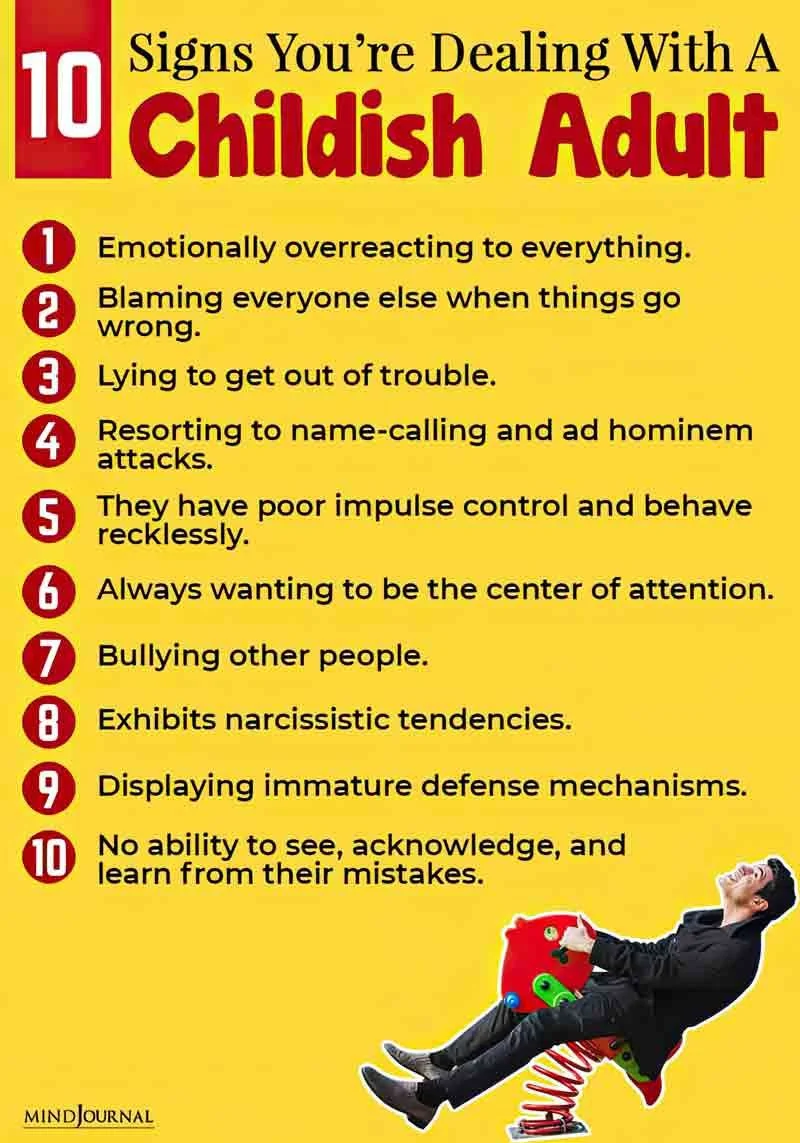Signs of Emotional Immaturity
• READ •
Signs of Emotional Immaturity
Behavior, thinking, and communication skills are all affected by emotional immaturity
When someone behaves in an emotionally immature way, you may notice that their feelings escalate quickly, similar to how a young child might react when things don’t go the way they want.
Below are some hallmark characteristics of emotional immaturity, along with examples that might feel familiar to you.
1. Difficulty Regulating Emotions
People acting with emotional immaturity have difficulty identifying, understanding, and managing emotions.
This means that feelings can swing suddenly from calm to upset. They may have trouble controlling impulses—such as saying something mean without thinking first—or making safe choices. They might even behave recklessly or make decisions they later regret.
People behaving in emotionally immature ways also tend to attack others, sometimes because they feel embarrassed, jealous, or frustrated and don’t know how to express those feelings politely.
For example, when waiting in line, a person behaving with emotional maturity will practice patience or calmly ask how much longer the wait might be.
A person behaving with emotional immaturity may start showing frustration or become aggressive. They might raise their voice, curse, stomp their feet, or leave the situation because they don’t want to wait like everyone else.
Imagine a student who doesn’t get picked first for a kickball game. A mature reaction might be to shrug and wait for their turn.
An emotionally immature reaction might be yelling, quitting the game, or saying “This is stupid!” and walking away.
Another example is immediately breaking down in tears and refusing to try again if they mess up a section of a difficult video game.
Or, if a friend cancels plans, an immature reaction is sending lots of angry messages or spreading rumors about the friend.
2. Self-Centered
Being self-centered means someone is focused mainly on their own wants, needs, or interests.
People with emotional immaturity often feel the need to be the center of attention and may believe that everything should go their way.
They may have a hard time understanding that other people also have thoughts and feelings.
Self-centered people may:
Feel entitled
Exhibit selfishness
Display an exaggerated sense of self-importance
See themselves as separate from other people
Experience selfless emotions (such as compassion or gratitude) less strongly
For instance, a self-centered person might insist on choosing the movie every time and get upset if anyone suggests a different one.
In class, they might interrupt others constantly or complain if the teacher praises another student.
They may have trouble sharing materials or taking turns, even though sharing is a normal part of growing up.
A self-centered person might hog the microphone during a school talent show, ignoring the time limit so they can keep singing, even though other students are waiting.
They may also spend their money only on things for themselves and refuse to contribute to a group gift for a friend.
3. Lack of Empathy
People with emotional immaturity may have difficulty understanding or caring about how others feel.
This lack of empathy can vary—some may struggle only in certain situations, while others consistently fail to consider others’ emotions.
Signs that someone may lack empathy include:
Being critical of others
Having minimal forgiveness
Victim-blaming
Feeling that others are “too sensitive”
Being self-centered
Poor listening skills
Getting impatient or frustrated with other people’s problems
An inability to understand other people’s feelings or situations
Not thinking about how their behavior affects others
Imagine a friend who laughs when someone falls down instead of checking if they’re hurt, or someone who says, “It’s not my problem,” when a classmate is upset.
Another example might be refusing to let someone join a group project because they “work too slowly,” without trying to understand why that person might need more time.
Another example is making fun of a classmate who gets nervous giving a presentation, instead of realizing that public speaking is difficult for some people.
They might also get annoyed when a sibling is sad about a pet passing away, saying things like, “Just get over it. It was only a cat.”
4. Relationship Issues
If you are in a relationship with someone who behaves with emotional immaturity, you may have experienced some or all of the behaviors listed here.
These relationships can be difficult because problems tend not to get resolved.
Instead of talking things out, emotionally immature people may blame others, shut down, or even explode.
Sometimes these behaviors can cross the line. Examples include:
Name-calling, which is a form of degradation and verbal assault
Blaming the other person for every conflict and refusing to admit any wrongdoing
Yelling or intimidating someone when they don’t get their way
Engaging in reckless behavior, such as doing something dangerous or harmful to “get back” at someone
Bullying to get the other person to give in
Denying things that obviously occurred (“I never said that!” when they clearly did)
Picture a friend who gets angry and threatens to stop talking to you if you don’t do what they want, or who constantly blames you for every disagreement.
These patterns make friendships stressful and unbalanced.
A person with relationship issues might demand that a friend always sit with them at lunch and refuse to speak to them if they choose to sit with someone else.
They might also constantly compare their accomplishments to a sibling’s and put them down, saying things like, “My drawing is way better than yours,” when the sibling shows them their art.
5. Poor Communication Skills
Communication is difficult for someone behaving with emotional immaturity.
They may feel attacked easily or get defensive when a simple problem is brought up. This can lead to dishonest or hurtful behaviors.
They may:
Deny they did anything wrong
Lie to escape uncomfortable conversations
Name-call during conflicts
This might look like a student who breaks a class rule and then immediately blames someone else, or someone who won’t listen during a group discussion and instead shouts over others.
They may change the subject, exaggerate, or even pretend they “don’t care” instead of communicating honestly.
When a parent asks an emotionally immature person about a bad grade, they might suddenly start complaining about how hard the teacher is, instead of talking about their effort.
Or, in a disagreement with a friend, they might yell, “You’re such a baby!” instead of explaining why they are upset.
6. Avoids Taking Responsibility
People behaving with emotional immaturity often blame others when things go wrong, or they deny their part in a conflict.
Taking responsibility feels uncomfortable for them, so they try to avoid it.
During a conflict, someone with emotional maturity can sit down and calmly talk through the issue.
A person behaving immaturely will likely become defensive, insist they did nothing wrong, or refuse to discuss the situation at all.
Imagine a student who accidentally knocks over someone’s project. A responsible reaction would be to apologize and offer to help fix it.
An emotionally immature reaction might be saying, “It wasn’t my fault!” or “Why was it in my way?” even when they know they caused the problem.
If a group project gets a low score because the emotionally immature person didn't do their part, they might complain loudly that the teacher is unfair or that the other group members rushed them.
7. Lacks Self-Reflection and Self-Awareness
People behaving with emotional immaturity tend not to learn well from past mistakes.
They may repeat behaviors that cause problems because they haven’t taken time to reflect or understand how their actions affect others.
Self-awareness means understanding ourselves
We need to understand our strengths, weaknesses, habits, and how others see us.
Emotionally immature individuals often lack this insight, making it difficult for them to recognize how their behavior contributes to challenges in friendships, school, and daily life.
For example, a student who constantly interrupts the teacher may not realize classmates are bothered or that it affects their learning.
They might not connect their actions with the consequences. If they repeatedly forget their lunch, a person who lacks self-reflection might just blame their parents for not reminding them, without thinking about how they could set their own reminder.
Another example is a student who keeps getting into arguments with the same people but never realizes that their own sarcasm or habit of rolling their eyes is what starts the conflicts.
The Road to Maturity
How do we move from less mature behaviors to more mature behaviors?
First, we must see the value of behavior more maturely. More mature people do better in life! More mature people are happier!
Second, we need the courage to look at ourselves honestly. None of us is perfect, so you are not alone if you find something you don’t like.
Third, we need self-awareness. If we are aware of wanting to act immaturely before we act, all the better!
Fourth, we must stay on the road to maturity for a long time!
1. Aggressive (adjective)
Acting in a forceful or angry way that can make others feel unsafe or uncomfortable.
2. Compassion (noun)
The caring feeling you get when you see someone hurting and want to help them.
3. Critical (adjective)
Finding faults or pointing out what is wrong, sometimes too harshly.
4. Defensive (adjective)
Acting as if you are being attacked, even when someone is just trying to talk or help.
5. Empathy (noun)
The ability to understand how someone else feels and imagine what they are going through.
6. Entitled (adjective)
Believing you deserve special treatment or should always get what you want.
7. Frustration (noun)
The feeling you get when something is difficult or doesn’t go the way you hoped.
8. Impulse (noun)
A sudden strong urge to act or say something without thinking it through first.
9. Responsibility (noun)
Being willing to admit your actions and do what needs to be done, even when it’s hard.
10. Self-aware (adjective)
Understanding your own thoughts, feelings, and behaviors, and how they affect others.
► COMPREHENSION QUESTIONS
— please answer with complete sentences
What is affected by emotional immaturity?
What does it mean to have “difficulty regulating emotions”?
Why might an emotionally immature person verbally attack another person?
What does it mean to be self-centered?
What does it mean to be “entitled”?
Hint: Look at definitions
What are some of the signs a person lacks empathy?
Note at least four signs.
When it comes to relationships, what are some of the behavior that cross the line?
What is self-awareness and how is it related to maturity?
What’s one thing you would like to change about your own behavior?
What’s something you feel you are mature about?


